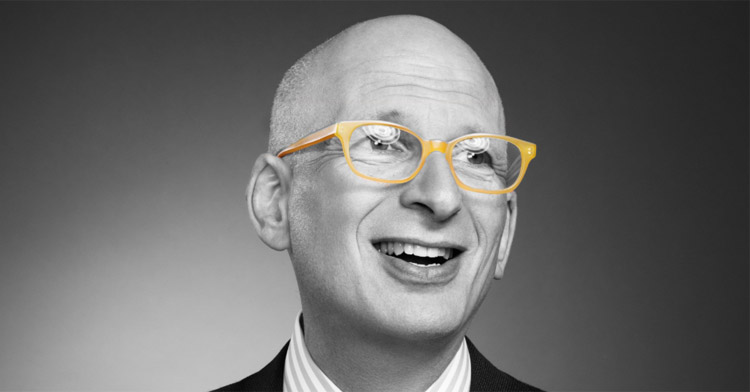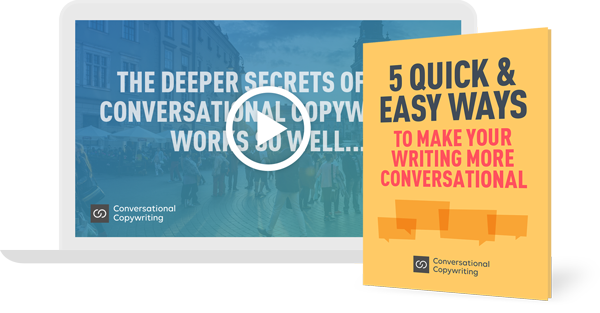
In this post I get to interview Seth Godin… author of 18 bestselling books, consummate marketer, entrepreneur, teacher and a good person.
That question about the protein.
Almost 20 years ago now Seth and I were booked to speak at the same event. We were both in town the evening before and went for dinner together.
As I studied the menu, Seth looked over and asked, “How do you take your protein?”
I remember that question because it stopped me dead in my tracks. I had to pause, unpack the meaning behind the question and think.
None of that would have happened if Seth has simply asked me, “Are you a vegetarian?”
If he’s asked me that, I’d have said no. Zero thought or reflection required.
By asking me a familiar question in a non-obvious way, he made me think. And when a question wakes you up and makes you think, it opens the door to learning something new.
I’ve watched and heard him do the same in his blog posts, books, interviews and podcasts ever since.
That, to my mind, is what makes Seth such a great teacher. He makes us rethink our assumptions about what we believe we already know.
With that said, let’s get started on the interview…
Nick: Seth, thank you so much for taking the time to do this with me. It’s hugely appreciated.
One of my early drafts of the headline for this interview went something like this… “Can ethical marketers thrive in a time of weaponized media?”
Back when we first met you had just written Permission Marketing. At that time and ever since, it seems to me you’ve been encouraging marketers to behave with decency, transparency and honesty.
Consider me a convert. I agree.
But when I look around today, I see an online marketplace that seems to be dominated by a race-to-the-bottom mentality. Every screen is awash with clickbait, and misleading sales copy. All supported by terabytes of data, and facilitated by increasingly sophisticated levels of marketing automation.
It’s a juggernaut. And I sometimes wonder whether decent, transparent and honest marketers can make themselves heard above the noise.
Can they? And if so, how?
Seth: Well, that’s what we SEE if we take a cursory look. The loud, selfish, narcissists are the ones that are the easiest to see. They fill our inboxes and they break our hearts.
But, below the surface, I’d argue that there are more ethical marketers than ever before. More people taking the long view, paying it forward and weaving together threads of value.
They’re harder to see. And that lack of visibility makes it tempting to believe that we’re chumps for not becoming spammers.
But the professionals among us, and the leaders and the artists—they’re doing work that matters for people who care.
Nick: So true. I probably spend way too much time getting upset about the bad players, when I should be ignoring them and focusing my attention on the creators who do work that really matters.
Next up…
Marketing 101 reminds us it’s easier to sell people what they already want, rather than what we think they should buy.
But as creators and entrepreneurs, aren’t we always poking and pushing… and trying to promote products and services people might not realise they want or need? Aren’t we looking to create change?
How can creators find that balance… between the easy road of giving people what they want, and the harder road of pushing against the tide with something new and valuable?
Seth: Let’s begin with the idea that we actually can’t change people, not really, not at their core. They believe what they believe, they want what they want. Our job is to tell them a story that resonates, that makes it clear that if they believe X and want Y, well then, our new product or service will help them achieve that.
Going to where people are is far more effective than insisting that they come to us.
Nick: In one of your recent Akimbo podcasts – I’m a huge fan – you were talking about the importance of timing. You mentioned that Steve Jobs would never have had the opportunity to create Apple if he had been born 20 years earlier or 20 years later.
That’s clearly true, and also a little scary. How does a creator know if the time is right?
Seth: Tactically? I have no idea. That’s like a sailor explaining how you know how to trim your sail in any given moment. But strategically, I think that experience teaches us what’s possible. Every once in a while, someone succeeds in doing something impossible, but I’m not crazy about that work—that’s the lottery.
The opportunity is to find a method, a process, a container—and to fit your work within that. You don’t need to be Gutenberg to publish a book. You don’t need to be Ada Lovelace to program a computer. Instead of trying to revolutionize the world, realize that the time is right to serve those that you seek to lead and change.
Nick: As you know, I teach a course on Conversational Copywriting.
At its heart, the course is about writing sales copy that is less about broadcasting a one-way sales message, and more about engaging with one’s readers in a more respectful and transparent way. Selling with natural enthusiasm and trust, not with manipulation and hype.
Most students stick around after taking the course. So we have a growing community of copywriters and small business owners who are committed to selling with this more conversational approach.
If you could share just one insight or piece of advice with them, what would that be?
Seth: That you just figured it out! That people want to be part of something, that they want to be seen, and to be connected. There’s a worldwide shortage of this.
Create something that people want to be part of, create a community, create a circle of respect, and all the marketing problems go away.
Nick: I love that – “create a circle of respect”. Yes, I try to keep that at the heart of my own work. And I really like how, when you think it through, your advice can be applied to any business, whether someone is a freelancer or a business owner.
You have a new book coming out soon… This Is Marketing. Can you tell us a little about the core message of the book?
Seth: It’s about work that matters for people who care. About people like us doing things like this. It’s about culture and change. Marketing is the act of changing something, and that change requires tension. I spend pages talking about status roles, about being affiliated with an idea or a community, and mostly, about how modern marketing is almost the exact opposite of advertising (yelling/tricking) at strangers.
Marketing is something we do with and for people now.
What modern copywriters have discovered is that there’s no shortage of things to read, no shortage of people yelling at us, pitching us, seeking to sharecrop our attention. The essence of my new book is that when we’re open to having a conversation — to seeing before being seen — we have the opportunity to serve, not to pitch.
Nick: I love that part about being open to having a conversation… seeing before being seen… and serving instead of pitching. Those are powerful ideas.
Seth, thank you. I really appreciate you taking the time to make this interview happen.
Check out Seth’s site. His daily blog. His podcast. And pre-order this new book, This Is Marketing.
Note: If you want to get some professional-grade training in the craft of conversational copywriting, find out about the Conversational Copywriting course here…

Wish the interview was longer!
Yet so much valuable nuggets here.
Thank you to both of you.
Enjoyable interview! Peter H Dailey, my marketing idol, always insisted he was a marketer, not an advertiser. His advertising agency, Dailey & Associates, became the largest west-coast based agency in the U.S. Ethics, integrity and honesty were the agency’s bedrock principles; i was so lucky to start my career there! Both you and Seth Godin remind me of the type of people I was fortunate to meet when I worked at Dailey & Associates.
Sounds like you had a wonderful start in the business. I hope you’re still leading the charge! : )
Interacting with our audience is key. Going to them – making sure we aren’t pushing something on them but truly understanding their needs and pain points – all go into making conversational copywriting a valuable asset in our writing toolboxes.
Thank you both for your time and discussion.
Hi Nick
Enjoyed ur interview with Seth Godin. I was almost intrigued by your questions as I was by his answers. I believe that much of what you are trying to achieve can be wrapped around a phrase that I brought to your attention a month ago: Narrowcasting vs. Broadcasting.
Thanks
Nick Adamo
Nice interview with Seth Godin, Nick. Kudos!
“Going to where people are is far more effective than insisting that they come to us.”
Love this! Goes hand in hand with having conversations instead of chatting at people. Better for engagement.
Exactly right. But it’s a tough lesson for many copywriters to learn. We feel the need to “sell”… to change people’s minds… to “make” people buy stuff. Too much push and not enough engagement.
Thanks Nick!
That was fun.
Thank you, Seth. A lot of people are getting a ton of value from your answers here. We really appreciate the time you took to do this.